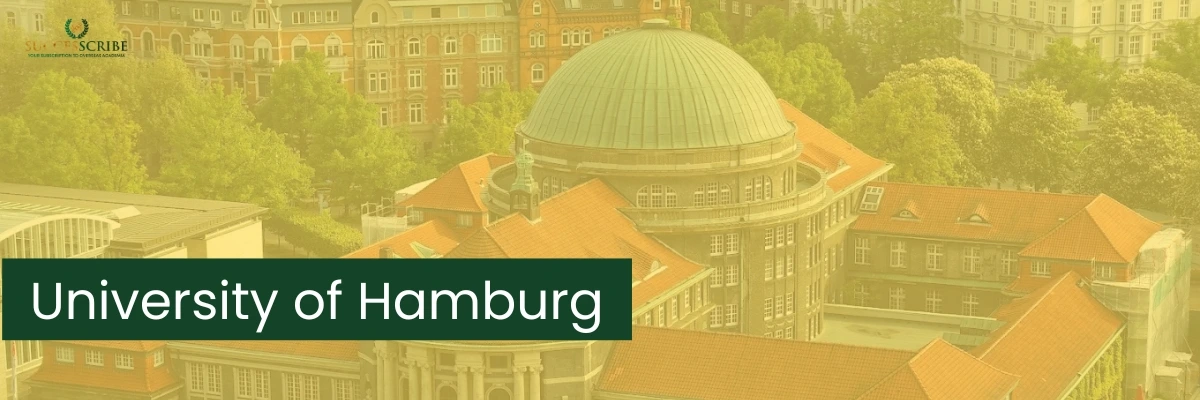Established in 1919, the University of Hamburg is one of Germany’s largest and most research-intensive public universities, home to over 42,800 students, including 5,000+ internationals from 130+ countries. Ranked #191 globally (QS 2025) and within Germany’s top 10, it offers 170+ degree programs across 8 faculties, with strong global recognition in physics, law, computer science, and climate research.
Known for its free tuition, world-class research, and strategic ties with companies like Google and Airbus, the university boasts an 88% master’s employment rate and a rich legacy that includes Nobel Prize winners and world leaders. Located in Hamburg a top European port city it truly lives up to its motto: “University for the World.
University of Hamburg: Overview
| Category | Details |
| Established | 1919 |
| Type | Public Research University |
| Location | Hamburg, Germany |
| Total Students | 42,819 |
| Faculties | 10 (including Law, Medicine, Humanities, Natural Sciences) |
| Language of Instruction | Mainly German, with many programs offered in English |
| Ranking | Among top 200 universities worldwide (QS World University Rankings) |
| Tuition Fees | No tuition fees for most programs (only semester contribution approx. €343) |
History and Evolution
The University of Hamburg was established during a transformative period in German history, emerging from the ashes of World War I as Hamburg sought to create an institution that would serve both academic and civic purposes. The university’s founding principle was to be a “university for the world” (Universität für die Welt), reflecting Hamburg’s international maritime heritage and cosmopolitan outlook.
The institution began with just four faculties: Law, Medicine, Philosophy, and Mathematics and Natural Sciences. Over the decades, it has expanded significantly, now encompassing eight faculties that cover virtually every major academic discipline. The university’s growth mirrors Hamburg’s development as a major European economic and cultural center.
During World War II, the university faced significant challenges, including the persecution of Jewish faculty and students under Nazi rule. The post-war reconstruction period marked a new chapter of growth and internationalization, positioning the university as a bridge between German academic traditions and global scholarly networks.
University of Hamburg Ranking and Reputation

The University of Hamburg maintains exceptional standing in international university rankings for 2025, demonstrating consistent improvement across multiple evaluation metrics. According to the latest QS World University Rankings 2025, the University of Hamburg has achieved a notable position between 195-230 globally, marking an upward trajectory in its international recognition.
| Ranking System | Global Position | German National Rank |
| QS World University Rankings | #191 | 10-13 |
| Times Higher Education 2025 | #132 | 7 |
| Academic Ranking of World Universities (ARWU) 2025 | 145-180 | 6-8 |
| U.S. News Global Universities 2025 | 161 | 8 |
Suggested Post: Heidelberg University admission requirements
University of Hamburg Computer Science Ranking
While specific QS subject rankings for Computer Science are not detailed, the university’s Faculty of Mathematics, Informatics, and Natural Sciences is renowned for its research and academic programs. The department offers a comprehensive curriculum encompassing various areas of computer science, preparing students for careers in academia, industry, and research.
| Ranking Organization | Global Rank | Notes |
| Times Higher Education (THE) | 401–500 | Reflects global teaching and research performance. |
| US News & World Report | #417 | Evaluates global research reputation and publications. |
| EduRank | #153 | Based on research output and citations in AI, ML, and Computer Vision. |
University of Hamburg Acceptance Rate

The University of Hamburg maintains strategically selective admission standards while preserving accessibility for qualified candidates from diverse global backgrounds. The 2025 acceptance rates reflect increased competitiveness across most programs due to growing international recognition and enhanced program quality.
| Category | Acceptance Rate |
| Overall Acceptance Rate | 18% |
| Estimated Acceptance Rate | 36%* |
The 36% figure is an estimation based on admission statistics of similar institutions, as the University of Hamburg does not officially publish acceptance rates.
Top Competitive Programs at the University of Hamburg: Acceptance Rates and Selectivity

Several programs at the University of Hamburg stand out for their competitiveness, attracting a large number of applicants for a limited number of spots. These programs often require exceptional academic records, relevant experience, and strong motivation from prospective students.
Estimated Acceptance Rates for Select Programs
These acceptance rates are estimated based on available data and may vary annually.
| Program Name | Degree Type | Language of Instruction | Estimated Acceptance Rate | Key Admission Requirements |
| Intelligent Adaptive Systems | M.Sc. | English | 12% | Bachelor’s in CS or related, strong programming skills |
| Molecular Life Sciences | M.Sc. | English/German | 15% | B.Sc. in biology, molecular biology, or biochemistry |
| Law (Staatsexamen & LL.M. International Law) | Staatsexamen/LL.M | German/English | 10% | Excellent academic record, German legal foundation |
| Physics (Advanced Imaging of Matter) | M.Sc. | English | 13% | Background in physics or nanoscience, high GPA |
| Psychology | B.Sc./M.Sc. | German | 14% | Numerus Clausus (NC) system, high GPA in related field |
| Innovation, Business and Sustainability | M.A. | English | 11% | Background in business/economics, strong motivation |
| Master of Peace and Security Studies | M.A. | English | 10% | Academic experience in IR, political science, security |
| Medical and Pharmaceutical Biotechnology | M.Sc. | German | 9% | B.Sc. in biotech/pharma/medicine, lab experience |
Suggested Post: Technical University Berlin admission requirements
Top Courses at the University of Hamburg (2025)

The following table highlights some of the most prominent programs at the University of Hamburg, recognized for their academic excellence and global rankings:
| Program Name | Degree Type | Language of Instruction | Global Ranking (2025) | Notable Features |
| Law | LL.M. | German/English | #66 (THE) | Strong focus on international law and legal theory. |
| Business Administration | M.Sc. | English | Top-ranked in CHE | EQUIS-accredited faculty with emphasis on research and practical application. |
| Computer Science | M.Sc. | English | Top 150 (QS) | Specializations in AI, data science, and cybersecurity. |
| Data Science | M.Sc. | English | Top 150 (QS) | Focus on big data technologies and predictive analytics. |
| Physics and Astronomy | M.Sc. | English | #49 (US News) | Renowned for research in quantum physics and astrophysics. |
| Molecular Life Sciences | M.Sc. | English/German | Top 150 (QS) | Interdisciplinary approach combining biology and biochemistry. |
| Innovation, Business and Sustainability | M.A. | English | Top-ranked in CHE | Integrates sustainability with business strategies. |
| Health Economics and Health Care Management | M.Sc. | English | Top-ranked in CHE | Addresses economic aspects of healthcare systems. |
| Psychology | B.Sc./M.Sc. | German | #101–125 (THE) | Comprehensive curriculum with research opportunities. |
| Education | M.A. | German | #82 (THE) | Emphasis on pedagogical theories and practices. |
Top Bachelor’s Programs at the University of Hamburg
The University of Hamburg offers over 70 bachelor’s degree programs, primarily taught in German, with a few exceptions. Below is a curated list of the most sought-after and academically strong bachelor’s
- Bachelor of Science in Psychology
- Bachelor of Science in Computer Science
- Bachelor of Arts in Political Science
- Bachelor of Arts in Sociology
- Bachelor of Science in Biology
- Bachelor of Arts in History
- Bachelor of Laws (LL.B.)
- Bachelor of Arts in Philosophy
Top Master’s Programs at the University of Hamburg
The University of Hamburg offers more than 100 master’s programs, many of which are taught in English, particularly in science, business, and interdisciplinary fields. Below are the top programs by popularity, academic strength, and employability:
- M.Sc. in Intelligent Adaptive Systems
- M.Sc. in Physics (Advanced Imaging of Matter)
- M.A. in International Business & Sustainability (MIBAS)
- M.Sc. in Molecular Life Sciences
- M.A. in Peace and Security Studies
- M.Sc. in Computer Science
- M.A. in Philosophy, Politics and Economics (PPE)
- M.Sc. in Health Economics and Healthcare Management
Suggested Post: RWTH Aachen University admission requirements
University of Hamburg Tuition Fees
The University of Hamburg continues to offer exceptional value in higher education as a public German university, maintaining its commitment to accessible, high-quality education.
As of 2025, the University of Hamburg (Universität Hamburg) continues to uphold its commitment to accessible education by not charging tuition fees for the majority of its programs, regardless of a student’s nationality. Instead, students are required to pay a semester contribution, which supports various student services and includes a public transportation pass.
| Student Category | Tuition Fees | Semester Contribution | Notes |
| EU/EEA Students | €0 | €343 | Includes administrative costs and a public transport pass. |
| Non-EU/EEA Students | €0 | €343 | Same structure as for EU/EEA students. |
| Special Programs (e.g., LL.M.) | Varies | €343 | Some specialized programs may have separate tuition fees. |
Certain specialized programs, such as the LL.M. in Law and Economics, may have separate tuition fees. For example, the LL.M. in Law and Economics charges €6,500 for European students and €11,000 for non-European students.
Cost of Living in Hamburg for Students
Include a monthly estimate with a breakdown:
| Expense | Estimated Monthly Cost (€) |
| Rent | 300–500 |
| Food | 150–250 |
| Health Insurance | 110 |
| Transportation (included in semester fee) | 0 |
| Leisure & Others | 100–150 |
| Total | €650–1,000 (estimated) |
Suggested Post: Technical university of Munich admission requirements
University of Hamburg Admission Requirements
University of Hamburg (Universität Hamburg) maintains clear and structured admission requirements for both bachelor’s and master’s programs, ensuring accessibility for international students.
Bachelor’s Programs
| Academic Qualification | Details |
| Academic Qualification | Must be equivalent to the German Abitur (high school leaving certificate). |
| Language of Instruction | Primarily German (very few English-taught bachelor’s programs). |
| German Language Proficiency | Required: TestDaF (minimum level 4 in all sections), DSH-2, or telc C1 Hochschule. |
| English Proficiency (if needed) | If applying for bilingual or English-taught programs: IELTS ≥ 6.5 or TOEFL iBT ≥ 90. |
| APS Certificate (India, Vietnam, China) | Mandatory for students from these countries to validate academic documents. |
| Special Requirements | Some programs (like Psychology, Medicine, Law) may have numerus clausus (NC) or entrance tests. |
| Passport & Visa Documents | Must be valid at time of application; visa process can take 6–12 weeks. |
Master’s Programs
| Academic Qualification | Details |
| Academic Qualification | A recognized Bachelor’s degree or equivalent. If the degree is pending, proof of enrollment and current transcript must be provided. |
| Grade Requirements (GPA) | Competitive programs prefer GPA ≥ 2.5 (German grading scale); varies by department. |
| Language of Instruction | Depends on the program – offered in German, English, or both. |
| German Proficiency (if applicable) | DSH-2, TestDaF (4×4), or telc C1 Hochschule for German-taught programs. |
| English Proficiency (if applicable) | IELTS (min 6.5), TOEFL iBT (min 90), or equivalent. |
| Program-Specific Requirements | May include CV, motivation letter, reference letters, or work experience. |
Application Documents Checklist (for both Bachelor’s & Master’s)
| Required Documents | Notes |
| Passport Copy | Valid for at least 6 months beyond intended date of entry. |
| School Leaving Certificate (Class 12) or Bachelor’s Degree | Must be officially translated into German or English. |
| Transcript of Records | Latest academic transcript with clear grade scale. |
| Language Certificate (German/English) | Only recognized tests accepted. |
| APS Certificate | Required for Indian, Chinese, Vietnamese students. |
| Motivation Letter (if needed) | Especially important for master’s applications in competitive programs. |
| CV/Resume | Standard European format (Europass format often recommended). |
| Reference Letters (if needed) | Usually 1–2 for master’s programs. |
| Additional Documents | Program-specific: e.g., portfolios for art/design, GRE for some STEM master’s programs. |
Suggested Post: Scholarships for undergraduates in Germany
University of Hamburg Application Deadlines

The University of Hamburg (UHH) offers a variety of programs across different faculties. Application deadlines vary based on the program type and semester. Below is a comprehensive overview:
| Program Type | Semester | Application Period | Notes |
| Bachelor & Staatsexamen | Winter Inake | June 1 – July 15 | Standard deadline for most undergraduate programs. |
| Master’s Programs | Winter Semester | May 1 – June 15 | New deadline effective from Winter Semester 2025/26. |
| International Master’s Programs | Winter Semester | February 15 – March 31 | Applies to select English-taught programs. |
| All Programs | Summer Semester | December 1 – January 15, | Applicable to programs with summer intakes. |
Faculties at the University of Hamburg
The University of Hamburg (Universität Hamburg) is one of the largest universities in Germany, and it operates through eight core faculties. These faculties form the academic backbone of the institution, each offering a diverse range of bachelor’s, master’s, and doctoral programs, supported by cutting-edge research and interdisciplinary collaboration.
As of 2025, over 43,000 students are enrolled across these faculties, with more than 5,000 international students contributing to its vibrant academic ecosystem.
| Faculty Name | Focus Areas | Popular Programs |
| Faculty of Law | Legal theory, international law, German public and civil law | Law (Staatsexamen), Master of Law (LL.M.) |
| Faculty of Business, Economics and Social Sciences (WiSo) | Business administration, economics, political science, sociology | MIBAS, MSc Economics, MA Political Science |
| Faculty of Medicine (UKE) | Clinical medicine, biomedical science, dentistry | State Exam in Medicine, MSc Molecular Biology |
| Faculty of Education | Teacher training, educational sciences, inclusive education | BEd and MEd programs in various subjects |
| Faculty of Humanities | History, languages, philosophy, cultural studies | BA History, MA Linguistics, MA Philosophy |
| Faculty of Mathematics, Informatics and Natural Sciences (MIN) | Mathematics, physics, computer science, earth and environmental sciences | MSc Physics, MSc Computer Science, MSc Meteorology |
| Faculty of Psychology and Human Movement Science | Psychology, neuropsychology, sport sciences | BSc Psychology, MSc Neurocognitive Psychology |
| Faculty of Theology | Christian theology, interfaith studies, religious education | BA Theology, MA Interreligious Studies |
Suggested Post: Scholarships for maters in Germany
Scholarships at the University of Hamburg
The University of Hamburg (Universität Hamburg) supports academic excellence, international diversity, and equal opportunity by offering a range of merit-based, need-based, and externally funded scholarships to both domestic and international students. Unlike many universities, Hamburg emphasizes non-tuition financial support, as tuition is largely free for public education in Germany.
University-Administered Scholarships (Directly from Universität Hamburg)
| Scholarship Name | Target Group | Amount (Monthly) |
| Merit Scholarship for International Students | International students with top academic performance | Up to €850 |
| Degree Completion Grant | International students nearing the end of their degree | €200 – €720 |
| International Mobility Grant (PROMOS) | All students pursuing internships or study abroad | €300 – €500 |
| Refugee Grant Program | Refugee-status students enrolled at UHH | €450 – €850 |
| Hilde Domin Program (via UHH) | At-risk international students | Full tuition + living |
German National & Federal Scholarships (Available to UHH Students)
| Scholarship Name | Administered By | Amount |
| Deutschlandstipendium | UHH + German Federal Government | €300/month |
| DAAD Scholarships | German Academic Exchange Service | €934 (Master), €1,200 (PhD) |
| Erasmus+ Grant | European Commission via UHH | €330–€450/month |
| Hamburg Ministry of Science (BWFG) | Local government | Varies |
Research & PhD Scholarships (Postgraduate Students)
| Scholarship Program | Focus Area | Funding |
| Doctoral Scholarships (UHH) | All research areas | €1,200–€1,350/month |
| Graduate School of Climate Sciences | Climate, earth sciences | Fully funded |
| MIN Graduate School Grants | Mathematics, Informatics, Natural Sciences | Fully funded |
| Research Training Groups (DFG) | Multidisciplinary doctoral research | €1,365+ travel costs |
Placements & Career Outcomes at the University of Hamburg

The University of Hamburg (Universität Hamburg), while following the German public university model (which does not have centralized placement cells like in India or the U.S.), offers strong career support systems, internship opportunities, and industry partnerships that lead to high employability among its graduates.
As of 2025, over 88% of master’s graduates and 81% of bachelor’s graduates find employment or enter further studies within 6–9 months of graduation.
| Degree Level | Employment Rate (within 9 months) | Median Starting Salary (Germany) | Further Study Rate |
| Bachelor’s (Overall) | 81% | €35,000 – €42,000/year | 16% |
| Master’s (Overall) | 88% | €45,000 – €56,000/year | 10% |
| PhD Graduates | 93% | €50,000 – €65,000/year | 5% (postdoc programs) |
Suggested Post: TOEFL accepting universities in Germany
International Collaborations, Global Offices & Strategic Partnerships
The University of Hamburg (UHH) stands as one of Germany’s most internationally active universities, fostering strong partnerships with leading academic institutions, global companies, and research consortia across the world. As a member of the German Excellence Strategy, UHH is globally recognized for its cross-border research, mobility programs, and internationalization strategy aimed at promoting global dialogue and academic mobility.
Key International Partnerships
The University of Hamburg has bilateral agreements, exchange programs, and joint research initiatives with leading global universities. Some major partnerships include:
| Institution | Country | Type of Collaboration |
| University of California, Berkeley | United States | Joint research, faculty mobility, PhD exchange |
| University of Tokyo | Japan | Climate science, quantum computing |
| Fudan University | China | Law and governance, student exchange |
| McGill University | Canada | Health science and neuroscience collaboration |
| University of Cape Town | South Africa | Sustainability and social justice programs |
| King’s College London | UK | European studies, public health |
| Université Paris Cité | France | Liberal arts and policy research |
| University of Delhi / JNU | India | Joint conferences and mobility programs |
Corporate & Industrial Partnerships
The University of Hamburg actively works with leading German and international companies to provide students with industry experience, research collaborations, and internship pipelines.
| Industry Partner | Type of Engagement |
| Airbus | Aerospace research, internships, Master’s thesis programs |
| Otto Group | Data science & e-commerce internships |
| Google Germany | AI ethics and computer science research |
| Unilever | Marketing research and sustainability programs |
| Beiersdorf AG | Chemistry and life sciences partnerships |
| Hapag-Lloyd | Logistics and international trade research |
| IBM Research Europe | Joint AI and data security labs |
Notable Alumni of the University of Hamburg

The University of Hamburg has a proud legacy of producing visionary leaders, Nobel laureates, influential academics, and industry pioneers across multiple disciplines. Its alumni network spans over 40,000 global professionals, many of whom have made groundbreaking contributions in their respective fields.
| Name | Field | Key Contributions/Position |
| Klaus Hasselmann | Climate Science / Physics | 2021 Nobel Laureate in Physics, pioneer in climate modeling |
| Harald Krüger | Business | Former CEO of BMW Group (2015–2019), global leader in automotive innovation |
| Christiane Woopen | Bioethics / Public Policy | Former Chair of the German Ethics Council, professor of medical ethics |
| Judith Rakers | Media / Journalism | Prominent news anchor for ARD Tagesschau, one of Germany’s most recognized journalists |
| Eva Illouz | Sociology / Academia | Influential sociologist and author, known for work on modern love and capitalism |
| Ernst Mayr (1904–2005) | Biology / Evolutionary Theory | Renowned evolutionary biologist and Harvard professor |
| Rolf-Dieter Heuer | Physic | Former Director-General of CERN, major contributor to particle physics research |
| Kirsten Boie | Literature / Children’s Books | Award-winning German children’s author, advocate for literacy and education |
| Joachim Gauck | Politics / Civil Rights | Former President of Germany (2012–2017), human rights activist |
Conclusion
With over 45,000 students from more than 150 countries, the University of Hamburg stands as a beacon of international education. Ranked among the top 5% of universities worldwide, it offers over 170 degree programs with zero tuition fees for most students. The university’s strong research output, boasting more than 4,000 publications annually, creates a dynamic environment for innovation and discovery. Choosing Hamburg means joining a vibrant, diverse community where your education is backed by world-class resources and a proven track record of success, all while enjoying an affordable, student-friendly city in the heart of Europe.
FAQs
How many international students study at the University of Hamburg?
The University of Hamburg hosts over 45,000 students, with approximately 15% being international students from more than 150 countries, making it a truly global community.
Are there tuition fees for international students at the University of Hamburg?
For most degree programs, especially at the undergraduate and master’s levels, there are no tuition fees. However, students pay a semester contribution of around €300, which covers administrative costs and public transportation.
Can international students work part-time while studying at the University of Hamburg?
Yes, international students are allowed to work up to 120 full or 240 half days per year. Many find jobs on campus or in the city to support their living costs.
Are there opportunities for internships during studies at the University of Hamburg?
Yes, many programs encourage or require internships. Hamburg’s robust business environment offers students excellent internship options in various sectors.
How competitive is admission to the University of Hamburg?
Admission depends on your program and qualifications. Some programs are highly competitive, especially in STEM fields, so strong academic records and language skills help.
Related Post
RWTH Aachen University
Technical University Berlin
Heidelberg University
Freie University of Berlin















